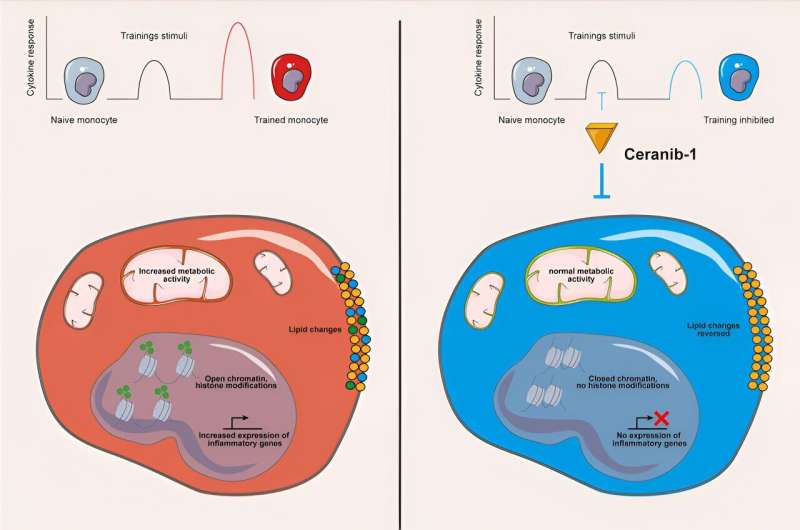This article has been reviewed according to Science X's editorial process and policies. Editors have highlighted the following attributes while ensuring the content's credibility:
fact-checked
peer-reviewed publication
trusted source
proofread
Mysterious fats reprogram the memory of innate immune cells

Researchers at Radboudumc have unveiled a fascinating connection between sphingolipids, mysterious fats named after the "Sphinx," and the memory of cells from the innate immune system. This discovery provides new avenues for the development of innovative treatments for various diseases, including autoimmune disorders, cancer, cardiovascular diseases, and organ transplantations, as outlined in a publication in Cell Reports.
The innate immune system, crucial for defense against infections, plays a key role in various diseases involving the immune system. The researchers have demonstrated that sphingolipids can reprogram the memory of innate immune cells, offering new possibilities for treatment.
The memory of innate immune cells, also known as trained immunity, enables these cells to respond stronger and faster during recurrent infections, a vital capability. However, in diseases where the innate immune system is overreactive, such as autoimmune diseases, cardiovascular diseases, and organ transplantations, this can have adverse effects. Understanding the molecular mechanisms behind this 'memory' is essential for developing new treatments for these diseases.
Manipulating innate immune memory with fats
An international research team led by Raphaël Duivenvoorden, together with researcher Nils Rother, discovered that sphingolipids play a crucial role in regulating trained immunity.
Using nanoparticles containing sphingolipids, they demonstrated that these fats determine the induction of trained immunity. Some sphingolipids inhibited memory, while others stimulated it. What makes this discovery even more remarkable is that inhibiting the protein acid ceramidase, which regulates sphingolipid metabolism in cells, had the most potent effect on suppressing trained immunity.
Rother says, "By inhibiting acid ceramidase, we can completely suppress the activation of trained immunity."
These findings provide new insights into how trained immunity is regulated and offer a new target for the development of treatments for diseases involving trained immunity. Manipulating the sphingolipid balance in innate immune cells opens new possibilities for developing therapies that can restore the balance between effective defense and an overactive response.
More information: Nils Rother et al, Acid ceramidase regulates innate immune memory, Cell Reports (2023). DOI: 10.1016/j.celrep.2023.113458. www.sciencedirect.com/science/ … ii/S2211124723014705




















